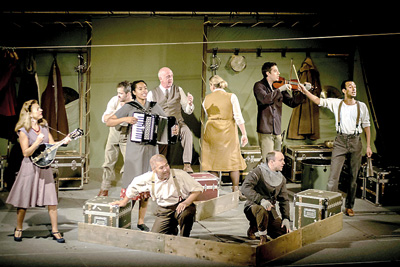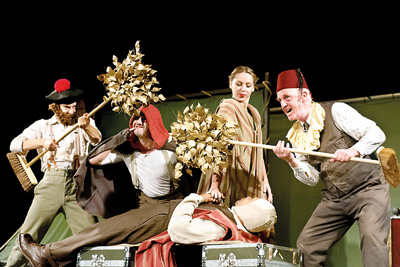Shakespeare, stripped down and uncomplicated
View(s):We’ve come dressed all nice to see Shakespeare, and we’re expecting it to be all posh and whatnot. But the house lights are on way after curtain time, and the actors are all out on stage, talking, laughing, putting their costumes on, tuning their instruments and such. Some of them are even walking out to the audience, shaking hands, striking up conversation. What is going on?

Setting the tone at the beginning: What’s up, has the play really started?
Globe-To-Globe brought Shakespeare’s “Hamlet” to Colombo on Thursday, May 14 at the British School Auditorium as part of “Shakespeare Lives”, a global, year-round celebration of the Bard’s 400th death anniversary in 2016. The performance wasn’t remarkable, there was no stunning cast or heart-swelling music, there were no fantastical lighting effects or flamboyant costumes, and there were no awe-inspiring props or beautifully choreographed dances either. There weren’t even any unexpected twists in the characterization. What the players served their audience was plain old Shakespeare, stripped down and uncomplicated.
By the time the house lights went down, the audience was quite loud, laughing, chattering, caught up by the festive music coming from the fiddles and whistlers onstage. The mood was effectively what it might have been in 17th century England when Shakespeare’s “Hamlet” was being set up for the first time.
Ladi Emeruwa played Hamlet, almost angry and sarcastic in his energy, lively and distinctly young, unlike the prematurely sober character we are used to. His madness was youthful angst with a sharpish edge, while Ophelia’s (portrayed by Jennifer Leong) was pitiful though not so heart-wrenching. The actors’ exchanges were quick and fresh, but we missed the sweetness of the revenge and the horror of the tragedy. Keith Bartlett added that missed touch of old-school gravitas to his nevertheless very funny Polonius, and Rawiri Paratene to his Claudius, in a production that was remarkably lightweight and surprisingly humorous.

Brilliant: The play within the play. Pix by Thiva Arunagirinathan
But even these, the players from the Globe, could not resist the lure of the play within a play. A classily executed, brilliantly comic mime stole the night. Throughout the play, and most markedly in this scene, Bill Barclay and Laura Forrest-Hay shined some simple, subtle, and effective music, to heighten psychological drama which, though it is expected in “Hamlet” if nothing else, seemed not to have been directed into this production. Two planks (and a passion), some screens to hide behind, and a single red curtain used at times for depth, at times for cover, at times for distraction and once for spinning the audience a full 180 degrees, were the only props they used.
The costumes were beautifully sober in colour with a refreshing touch of ad-hoc, quite different to the garish shiny and colourful dress we are used to seeing on a Sri Lankan stage. This added to the atmosphere of recreating a scene of the original staging – the Globe in its golden age, the penniless actors making do for the sake of a wild writer, trying hard to put up the best show possible to keep a rowdy crowd from stampeding them. The stage lights were also uniform throughout – though we hoped they might be dimmed towards the end, how the sun may have gone down on the Globe!
Putting up Shakespeare’s plays, and one of his most-loved at that, is a risky business for anyone, anywhere, even Dominic Dromgoole, artistic director of Shakespeare’s Globe. But the same (twelve) players “travelling to every country on earth” in a span of two years is a monumental task, for which sacrifices must be made, in text and style. This production was refreshingly free of any post-modern contextualization and therefore so much more accessible than even some contemporary productions which aim precisely to be so.
And though many who came with expectation might not have been made happy the way they expected, all were likely to have walked away a little bemused and a little more aware of how little we know of the play and the playwright we think we know so well.


